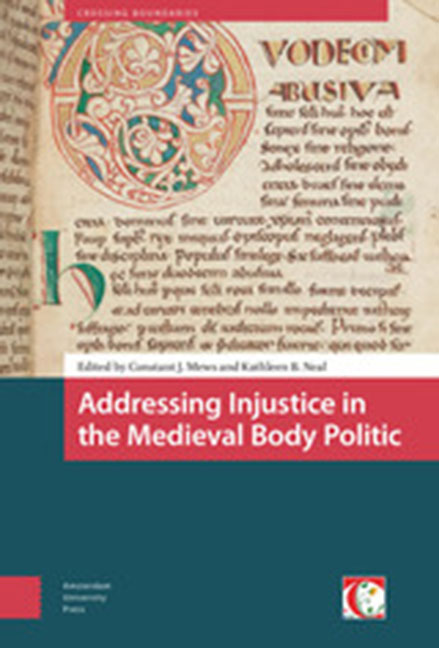Book contents
- Frontmatter
- Contents
- Acknowledgements
- Abbreviations
- Note on References
- List of Tables and Illustrations
- Introduction: Justice and its Abuse in the Medieval Body Politic
- 1 The De XII abusiuis saeculi: Contexts and Textual Traditions
- 2 The Irish Background to the De XII abusiuis saeculi
- 3 ‘Each in the Calling to Which They are Called’: Images of Authority in the De XII abusiuis saeculi
- 4 Transforming Irish Traditions: De XII abusiuis saeculi and Justice in the Frankish World, c. 750–1050
- 5 The Unjust King and the Negligent Bishop: Addressing Injustice in Eleventh and Twelfth-Century England and Germany
- 6 Reflecting on Abuses in Religious Life: From The Twelve Abuses of the Cloister to The Cloister of the Soul
- 7 Preaching the Body Politic: John of Wales and Franciscan Political Thought in the Late Thirteenth Century
- 8 Justice and Its Abuses in the Speculum justiciariorum
- 9 Addressing Abuses and Injustice in the Court of Philip the Fair: The De informatione principum of Durand of Champagne
- 10 ‘Perfect Justice Weighs Everything on a Balanced Scale’: Italian Friars on Equity, the Common Good, and the Commune c. 1270–c. 1310
- 11 Some Late Franciscan Rewritings of the Twelve Abuses
- Appendix: On the Twelve Abuses of the Age A Translation
- Bibliography
- Index of Biblical References
- Index of Manuscripts
- General Index
11 - Some Late Franciscan Rewritings of the Twelve Abuses
Published online by Cambridge University Press: 14 February 2024
- Frontmatter
- Contents
- Acknowledgements
- Abbreviations
- Note on References
- List of Tables and Illustrations
- Introduction: Justice and its Abuse in the Medieval Body Politic
- 1 The De XII abusiuis saeculi: Contexts and Textual Traditions
- 2 The Irish Background to the De XII abusiuis saeculi
- 3 ‘Each in the Calling to Which They are Called’: Images of Authority in the De XII abusiuis saeculi
- 4 Transforming Irish Traditions: De XII abusiuis saeculi and Justice in the Frankish World, c. 750–1050
- 5 The Unjust King and the Negligent Bishop: Addressing Injustice in Eleventh and Twelfth-Century England and Germany
- 6 Reflecting on Abuses in Religious Life: From The Twelve Abuses of the Cloister to The Cloister of the Soul
- 7 Preaching the Body Politic: John of Wales and Franciscan Political Thought in the Late Thirteenth Century
- 8 Justice and Its Abuses in the Speculum justiciariorum
- 9 Addressing Abuses and Injustice in the Court of Philip the Fair: The De informatione principum of Durand of Champagne
- 10 ‘Perfect Justice Weighs Everything on a Balanced Scale’: Italian Friars on Equity, the Common Good, and the Commune c. 1270–c. 1310
- 11 Some Late Franciscan Rewritings of the Twelve Abuses
- Appendix: On the Twelve Abuses of the Age A Translation
- Bibliography
- Index of Biblical References
- Index of Manuscripts
- General Index
Summary
Abstract
A distinct version of the De XII abusiuis saeculi appears among documents produced by the Fraticelli in late fourteenth-century Florence, in the Tuscan vernacular. The same document is also preserved in Latin among works by Peter John Olivi, copied by Bernardino da Siena in the 1420s, presumably out of materials confiscated from a group of Fraticelli. The chapter discusses the possibility of Olivi's authorship of this piece, and argues that this list of abuses represents in any event a summary of a vision shared by Olivi and his disciples regarding the corruption of the Church and of the social world that calls for the coming of the Antichrist. It also discusses and edits another reworking of these abuses among the works of Bernardino da Siena.
Keywords: Fraticelli, spiritual Franciscans, Peter John Olivi, Bernardino da Siena, religious reform
The circulation of the De XII abusiuis saeculi among thirteenth-century Franciscans was so intense that it is not entirely surprising to find a new version appearing at the time when the Observants took hold of the books of the Spirituals in the early fifteenth century. The item we shall discuss in this final chapter features in the codex Siena, Biblioteca Comunale degli Intronati, MS U.V.5. This small size volume was entirely copied and annotated by Bernardino da Siena himself (1380–1444) at an early stage of his preaching career, probably in the first part of the 1420s. After some extracts from Bonaventure's De triplici via and Itinerarium mentis in Deum, it comprises a series of excerpts from a large array of writings by the main Spiritual Franciscan authors: Peter John Olivi, Ubertino da Casale, Jacopone da Todi and Ugo Panziera. Olivi is by far the most frequently represented writer in a collection that reflects the contents of a remarkable selection of prohibited texts to which Bernardino had access.
It has long been noted that the early Italian Observant theologians and preachers, and in the first place, Bernardino, made abundant use of the writings of the Spirituals, especially Olivi and Ubertino. The way in which they could access those works is less often stressed. Throughout the fourteenth century, dissident groups carefully kept at hand the documents that defined the basis of their opposition to the papacy and the Franciscan hierarchy, after they had broken their allegiance to John XXII and the leaders of the Order.
- Type
- Chapter
- Information
- Addressing Injustice in the Medieval Body Politic , pp. 311 - 324Publisher: Amsterdam University PressPrint publication year: 2023



